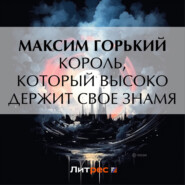По всем вопросам обращайтесь на: info@litportal.ru
(©) 2003-2024.
✖
The Man Who Was Afraid
Настройки чтения
Размер шрифта
Высота строк
Поля
“I’d rather send for them now.”
“They’ll soon toll for the mass – the priest isn’t home – and then there’s no hurry, it may pass soon.”
And he noisily started to sip the tea out of the saucer.
“I should live another year or two. You are young, and I am very much afraid for you. Live honestly and firmly; do not covet what belongs to other people, take good care of your own.”
It was hard for him to speak, he stopped short and rubbed his chest with his hand.
“Do not rely upon others; expect but little from them. We all live in order to take, not to give. Oh Lord! Have mercy on the sinner!”
Somewhere in the distance the deep sound of the bell fell on the silence of the morning. Ignat and Foma crossed themselves three times.
After the first sound of the bell-tone came another, then a third, and soon the air was filled with sounds of the church-bells, coming from all sides – flowing, measured, calling aloud.
“There, they are tolling for the mass,” said Ignat, listening to the echo of the bell-metal. “Can you tell the bells by their sounds?”
“No,” answered Foma.
“Just listen. This one now – do you hear? the bass – this is from the Nikola Church. It was presented by Peter Mitrich Vyagin – and this, the hoarse one – this is at the church of Praskeva Pyatnitza.”
The singing waves of the bell-tones agitated the air, which was filled with them, and they died away in the clear blue of the sky. Foma stared thoughtfully at his father’s face and saw that the alarm was disappearing from his eyes, and that they were now brighter.
But suddenly the old man’s face turned very red, his eyes distended and rolled out of their orbits, his mouth opened with fright, and from it issued a strange, hissing sound:
“F-F-A-A-ch.”
Immediately after this Ignat’s head fell back on his shoulder, and his heavy body slowly slipped down from the chair to the ground as if the earth had dragged him imperiously unto itself. Foma was motionless and silent for awhile, then he rushed up to Ignat, lifted his head from the ground and looked into his face. The face was dark, motionless, and the wide-open eyes expressed nothing – neither pain, nor fear, nor joy. Foma looked around him. As before, nobody was in the garden, and the resounding chatter of the bells was still roaring in the air. Foma’s hands began to tremble, he let go his father’s head, and it struck heavily against the ground. Dark, thick blood began to gush in a narrow stream from his open mouth across his blue cheek.
Foma struck his breast with both hands, and kneeling before the dead body, he wildly cried aloud. He was trembling with fright, and with eyes like those of a madman he was searching for someone in the verdure of the garden.
CHAPTER IV
HIS father’s death stupefied Foma and filled him with a strange sensation; quiet was poured into his soul – a painful, immovable quiet, which absorbed all the sounds of life without accounting for it. All sorts of acquaintances were bustling about him; they appeared, disappeared, said something to him – his replies to them were untimely, and their words called forth no images in him, drowning, without leaving any trace, in the bottomless depths of the death-like silence which filled his soul. He neither cried, nor grieved, nor thought of anything; pale and gloomy, with knitted brow, he was attentively listening to this quiet, which had forced out all his feelings, benumbed his heart and tightly clutched his brains. He was conscious but of the purely physical sensation of heaviness in all his frame and particularly in his breast, and then it also seemed to him that it was always twilight, and even though the sun was still high in the sky – everything on earth looked dark and melancholy.
The funeral was arranged by Mayakin. Hastily and briskly he was bustling about in the rooms, making much clatter with the heels of his boots; he cried at the household help imperiously, clapped his godson on the shoulder, consoling him:
“And why are you petrified? Roar and you will feel relieved. Your father was old – old in body. Death is prepared for all of us, you cannot escape it – consequently you must not be prematurely torpid. You cannot bring him to life again with your sorrow, and your grief is unnecessary to him, for it is said: ‘When the body is robbed of the soul by the terrible angels, the soul forgets all relatives and acquaintances,’ which means that you are of no consequence to him now, whether you cry or laugh. But the living must care for the living. You had better cry, for this is human. It brings much relief to the heart.”
But neither did these words provoke anything in Foma’s head or in his heart. He came to himself, however, on the day of the funeral, thanks to the persistence of his godfather, who was assiduously and oddly trying to rouse his sad soul.
The day of the funeral was cloudy and dreary. Amid a heavy cloud of dust an enormous crowd of people, winding like a black ribbon, followed the coffin of Ignat Gordyeeff. Here and there flashed the gold of the priest’s robes, and the dull noise of the slow movement of the crowd blended in harmony with the solemn music of the choir, composed of the bishop’s choristers. Foma was pushed from behind and from the sides; he walked, seeing nothing but the gray head of his father, and the mournful singing resounded in his heart like a melancholy echo. And Mayakin, walking beside him, kept on intrusively whispering in his ears:
“Look, what a crowd – thousands! The governor himself came out to accompany your father to the church, the mayor, and almost the entire city council. And behind you – just turn around! There goes Sophya Pavlovna. The town pays its respects to Ignat.”
At first Foma did not listen to his godfather’s whisper, but when he mentioned Medinskaya, he involuntarily looked back and noticed the governor. A little drop of something pleasant fell into his heart at the sight of this important personage, with a bright ribbon across his shoulder, with orders on his breast, pacing after the coffin, an expression of sorrow on his stern countenance.
“Blessed is the road where this soul goeth today,” Yakov Tarasovich hummed softly, moving his nose, and he again whispered in his godson’s ear:
“Seventy-five thousand roubles is such a sum that you can demand so many escorts for it. Have you heard that Sonka is making arrangements for the laying of the corner-stone on the fifteenth? Just forty days after the death of your father.”
Foma again turned back, and his eyes met the eyes of Medinskaya. He heaved a deep sigh at her caressing glance, and felt relieved at once, as if a warm ray of light penetrated his soul and something melted there. And then and there he considered that it was unbecoming him to turn his head from side to side.
At church Foma’s head began to ache, and it seemed to him that everything around and underneath him was shaking. In the stifling air, filled with dust, with the breathing of the people and the smoke of the incense, the flames of the candles were timidly trembling. The meek image of Christ looked down at him from the big ikon, and the flames of the candles, reflected in the tarnished gold of the crown over the Saviour’s brow, reminded him of drops of blood.
Foma’s awakened soul was greedily feeding itself on the solemn, gloomy poetry of the liturgy, and when the touching citation was heard, “Come, let us give him the last kiss,” a loud, wailing sob escaped from Foma’s chest, and the crowd in church was stirred to agitation by this outburst of grief.
Having uttered the sob, Foma staggered. His godfather immediately caugh thim by his arms and began to push him forward to the coffin, singingquite loudly and with some anger:
“Kiss him who was but lately with us.
Kiss, Foma, kiss him – he is given over to the grave, covered with a stone.
He is settling down in darkness, and is buried with the dead.”
Foma touched his father’s forehead with his lips and sprang back from the coffin with horror.
“Hold your peace! You nearly knocked me down,” Mayakin remarked to him, in a low voice, and these simple, calm words supported Foma better than his godfather’s hands.
“Ye that behold me mute and lifeless before you, weep for me, brethren and friends,” begged Ignat through the mouth of the Church. But his son was not crying any longer; his horror was called forth by the black, swollen face of his father, and this horror somewhat sobered his soul, which had been intoxicated by the mournful music of the Church’s lament for its sinful son. He was surrounded by acquaintances, who were kindly consoling him; he listened to them and understood that they all felt sorry for him and that he became dear to them. And his godfather whispered in his ear:
“See, how they all fawn upon you. The tom-cats have smelt the fat.”
These words were unpleasant to Foma, but they were useful to him, as they caused him to answer at all events.
At the cemetery, when they sang for Ignat’s eternal memory, he cried again bitterly and loud. His godfather immediately seized him by the arms and led him away from the grave, speaking to him earnestly:
“What a faint-hearted fellow you are! Do I not feel sorry for him? I have known his real value, while you were but his son. And yet, I do not cry. For more than thirty years we lived together in perfect harmony – how much had been spoken, how much thought – how much sorrow drunk. You are young; it is not for you to grieve! Your life is before you, and you will be rich in all sorts of friendship; while I am old, and now that I buried my only friend, I am like a pauper. I can no longer make a bosom friend!”
The old man’s voice began to jar and squeak queerly. His face was distorted, his lips were stretched into a big grimace and were quivering, and from his small eyes frequent tears were running over the now contracted wrinkles of his face. He looked so pitiful and so unlike himself, that Foma stopped short, pressed him close to his body with the tenderness of a strong man and cried with alarm:
“Don’t cry, father – darling! Don’t cry.”
“There you have it!” said Mayakin, faintly, and, heaving a deep sigh, he suddenly turned again into a firm and clever old man.
“You must not cry,” said he, mysteriously, seating himself in the carriage beside his godson. “You are now the commander-in-chief in the war and you must command your soldiers bravely. Your soldiers are the roubles, and you have a great army of these. Make war incessantly!”
Surprised at the quickness of his transformation, Foma listened to his words and for some reason or other they reminded him of those clods of earth, which the people threw into Ignat’s grave upon his coffin.
“On whom am I to make war?” said Foma with a sigh.
“I’ll teach you that! Did your father tell you that I was a clever old man and that you should mind me?”
“He did.”
“Then do mind me! If my mind should be added to your youthful strength, a good victory might be won. Your father was a great man, but he did not look far before him and he could not take my advice. He gained success in life not with his mind, but more with his head. Oh, what will become of you? You had better move into my house, for you will feel lonesome in yours.”
“Aunt is there.”
“Aunt? She is sick. She will not live long.”
“They’ll soon toll for the mass – the priest isn’t home – and then there’s no hurry, it may pass soon.”
And he noisily started to sip the tea out of the saucer.
“I should live another year or two. You are young, and I am very much afraid for you. Live honestly and firmly; do not covet what belongs to other people, take good care of your own.”
It was hard for him to speak, he stopped short and rubbed his chest with his hand.
“Do not rely upon others; expect but little from them. We all live in order to take, not to give. Oh Lord! Have mercy on the sinner!”
Somewhere in the distance the deep sound of the bell fell on the silence of the morning. Ignat and Foma crossed themselves three times.
After the first sound of the bell-tone came another, then a third, and soon the air was filled with sounds of the church-bells, coming from all sides – flowing, measured, calling aloud.
“There, they are tolling for the mass,” said Ignat, listening to the echo of the bell-metal. “Can you tell the bells by their sounds?”
“No,” answered Foma.
“Just listen. This one now – do you hear? the bass – this is from the Nikola Church. It was presented by Peter Mitrich Vyagin – and this, the hoarse one – this is at the church of Praskeva Pyatnitza.”
The singing waves of the bell-tones agitated the air, which was filled with them, and they died away in the clear blue of the sky. Foma stared thoughtfully at his father’s face and saw that the alarm was disappearing from his eyes, and that they were now brighter.
But suddenly the old man’s face turned very red, his eyes distended and rolled out of their orbits, his mouth opened with fright, and from it issued a strange, hissing sound:
“F-F-A-A-ch.”
Immediately after this Ignat’s head fell back on his shoulder, and his heavy body slowly slipped down from the chair to the ground as if the earth had dragged him imperiously unto itself. Foma was motionless and silent for awhile, then he rushed up to Ignat, lifted his head from the ground and looked into his face. The face was dark, motionless, and the wide-open eyes expressed nothing – neither pain, nor fear, nor joy. Foma looked around him. As before, nobody was in the garden, and the resounding chatter of the bells was still roaring in the air. Foma’s hands began to tremble, he let go his father’s head, and it struck heavily against the ground. Dark, thick blood began to gush in a narrow stream from his open mouth across his blue cheek.
Foma struck his breast with both hands, and kneeling before the dead body, he wildly cried aloud. He was trembling with fright, and with eyes like those of a madman he was searching for someone in the verdure of the garden.
CHAPTER IV
HIS father’s death stupefied Foma and filled him with a strange sensation; quiet was poured into his soul – a painful, immovable quiet, which absorbed all the sounds of life without accounting for it. All sorts of acquaintances were bustling about him; they appeared, disappeared, said something to him – his replies to them were untimely, and their words called forth no images in him, drowning, without leaving any trace, in the bottomless depths of the death-like silence which filled his soul. He neither cried, nor grieved, nor thought of anything; pale and gloomy, with knitted brow, he was attentively listening to this quiet, which had forced out all his feelings, benumbed his heart and tightly clutched his brains. He was conscious but of the purely physical sensation of heaviness in all his frame and particularly in his breast, and then it also seemed to him that it was always twilight, and even though the sun was still high in the sky – everything on earth looked dark and melancholy.
The funeral was arranged by Mayakin. Hastily and briskly he was bustling about in the rooms, making much clatter with the heels of his boots; he cried at the household help imperiously, clapped his godson on the shoulder, consoling him:
“And why are you petrified? Roar and you will feel relieved. Your father was old – old in body. Death is prepared for all of us, you cannot escape it – consequently you must not be prematurely torpid. You cannot bring him to life again with your sorrow, and your grief is unnecessary to him, for it is said: ‘When the body is robbed of the soul by the terrible angels, the soul forgets all relatives and acquaintances,’ which means that you are of no consequence to him now, whether you cry or laugh. But the living must care for the living. You had better cry, for this is human. It brings much relief to the heart.”
But neither did these words provoke anything in Foma’s head or in his heart. He came to himself, however, on the day of the funeral, thanks to the persistence of his godfather, who was assiduously and oddly trying to rouse his sad soul.
The day of the funeral was cloudy and dreary. Amid a heavy cloud of dust an enormous crowd of people, winding like a black ribbon, followed the coffin of Ignat Gordyeeff. Here and there flashed the gold of the priest’s robes, and the dull noise of the slow movement of the crowd blended in harmony with the solemn music of the choir, composed of the bishop’s choristers. Foma was pushed from behind and from the sides; he walked, seeing nothing but the gray head of his father, and the mournful singing resounded in his heart like a melancholy echo. And Mayakin, walking beside him, kept on intrusively whispering in his ears:
“Look, what a crowd – thousands! The governor himself came out to accompany your father to the church, the mayor, and almost the entire city council. And behind you – just turn around! There goes Sophya Pavlovna. The town pays its respects to Ignat.”
At first Foma did not listen to his godfather’s whisper, but when he mentioned Medinskaya, he involuntarily looked back and noticed the governor. A little drop of something pleasant fell into his heart at the sight of this important personage, with a bright ribbon across his shoulder, with orders on his breast, pacing after the coffin, an expression of sorrow on his stern countenance.
“Blessed is the road where this soul goeth today,” Yakov Tarasovich hummed softly, moving his nose, and he again whispered in his godson’s ear:
“Seventy-five thousand roubles is such a sum that you can demand so many escorts for it. Have you heard that Sonka is making arrangements for the laying of the corner-stone on the fifteenth? Just forty days after the death of your father.”
Foma again turned back, and his eyes met the eyes of Medinskaya. He heaved a deep sigh at her caressing glance, and felt relieved at once, as if a warm ray of light penetrated his soul and something melted there. And then and there he considered that it was unbecoming him to turn his head from side to side.
At church Foma’s head began to ache, and it seemed to him that everything around and underneath him was shaking. In the stifling air, filled with dust, with the breathing of the people and the smoke of the incense, the flames of the candles were timidly trembling. The meek image of Christ looked down at him from the big ikon, and the flames of the candles, reflected in the tarnished gold of the crown over the Saviour’s brow, reminded him of drops of blood.
Foma’s awakened soul was greedily feeding itself on the solemn, gloomy poetry of the liturgy, and when the touching citation was heard, “Come, let us give him the last kiss,” a loud, wailing sob escaped from Foma’s chest, and the crowd in church was stirred to agitation by this outburst of grief.
Having uttered the sob, Foma staggered. His godfather immediately caugh thim by his arms and began to push him forward to the coffin, singingquite loudly and with some anger:
“Kiss him who was but lately with us.
Kiss, Foma, kiss him – he is given over to the grave, covered with a stone.
He is settling down in darkness, and is buried with the dead.”
Foma touched his father’s forehead with his lips and sprang back from the coffin with horror.
“Hold your peace! You nearly knocked me down,” Mayakin remarked to him, in a low voice, and these simple, calm words supported Foma better than his godfather’s hands.
“Ye that behold me mute and lifeless before you, weep for me, brethren and friends,” begged Ignat through the mouth of the Church. But his son was not crying any longer; his horror was called forth by the black, swollen face of his father, and this horror somewhat sobered his soul, which had been intoxicated by the mournful music of the Church’s lament for its sinful son. He was surrounded by acquaintances, who were kindly consoling him; he listened to them and understood that they all felt sorry for him and that he became dear to them. And his godfather whispered in his ear:
“See, how they all fawn upon you. The tom-cats have smelt the fat.”
These words were unpleasant to Foma, but they were useful to him, as they caused him to answer at all events.
At the cemetery, when they sang for Ignat’s eternal memory, he cried again bitterly and loud. His godfather immediately seized him by the arms and led him away from the grave, speaking to him earnestly:
“What a faint-hearted fellow you are! Do I not feel sorry for him? I have known his real value, while you were but his son. And yet, I do not cry. For more than thirty years we lived together in perfect harmony – how much had been spoken, how much thought – how much sorrow drunk. You are young; it is not for you to grieve! Your life is before you, and you will be rich in all sorts of friendship; while I am old, and now that I buried my only friend, I am like a pauper. I can no longer make a bosom friend!”
The old man’s voice began to jar and squeak queerly. His face was distorted, his lips were stretched into a big grimace and were quivering, and from his small eyes frequent tears were running over the now contracted wrinkles of his face. He looked so pitiful and so unlike himself, that Foma stopped short, pressed him close to his body with the tenderness of a strong man and cried with alarm:
“Don’t cry, father – darling! Don’t cry.”
“There you have it!” said Mayakin, faintly, and, heaving a deep sigh, he suddenly turned again into a firm and clever old man.
“You must not cry,” said he, mysteriously, seating himself in the carriage beside his godson. “You are now the commander-in-chief in the war and you must command your soldiers bravely. Your soldiers are the roubles, and you have a great army of these. Make war incessantly!”
Surprised at the quickness of his transformation, Foma listened to his words and for some reason or other they reminded him of those clods of earth, which the people threw into Ignat’s grave upon his coffin.
“On whom am I to make war?” said Foma with a sigh.
“I’ll teach you that! Did your father tell you that I was a clever old man and that you should mind me?”
“He did.”
“Then do mind me! If my mind should be added to your youthful strength, a good victory might be won. Your father was a great man, but he did not look far before him and he could not take my advice. He gained success in life not with his mind, but more with his head. Oh, what will become of you? You had better move into my house, for you will feel lonesome in yours.”
“Aunt is there.”
“Aunt? She is sick. She will not live long.”

















